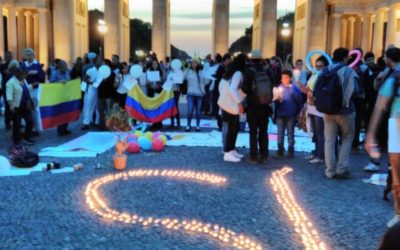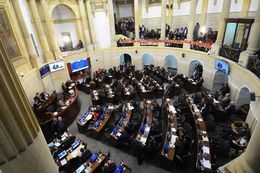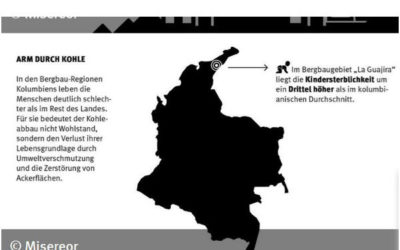‚Years of solitude continue‘ explores how the Colombian Peace Agreement, signed on 24 November 2016, is having a very limited impact on the lives of scores of Indigenous and afro-descendant communities in the department of Chocó.
22 November 2017 , Index number: AMR 23/7425/2017
EXECUTIVE SUMMARY
In December 2016, the Colombian Congress ratified the Peace Agreement between the government and the Revolutionary Armed Forces of Colombia (Fuerzas Armadas Revolucionarias de Colombia, FARC). The ratification marked the official end of more than 50 years of armed conflict between the two parties and was the culmination of more than four years of negotiations. However, violence has continued in many areas of the country and there has been an increase in killings and attacks against human rights defenders, including Indigenous, Afro-descendant and campesino (peasant farmer) leaders. Unless this grave situation is addressed by the authorities, it risks undermining the chances of a durable and sustainable peace in which human rights of the entire population are at the heart of the policies implemented.
In this context, Amnesty International is publishing this report in order to document the way in which Point Five of the Peace Agreement (Victims Clause) is being implemented in the department of Chocó, one of the areas most affected by human rights violations during the armed conflict. Point Five of the Peace Agreement defines comprehensive reparation for victims and establishes that the parties to the Agreement commit to ensure victims’ rights are restored and their living conditions transformed. This report seeks to identify the areas where the state has failed most significantly to fulfil its international obligations to protect the rights to life, physical integrity and security of Indigenous Peoples and Afro- descendant communities in order to put forward recommendations of concrete measures that would ensure a sustainable and lasting peace.
Amnesty International has focused its research on the department of Chocó because it is an area that has been constantly disputed by parties to the armed conflict. This has left in its wake an appalling toll of civilian casualties – most of them members of Indigenous or Afro-descendant communities. The victims are still waiting for their rights to truth, justice, reparation and non-repetition to be guaranteed. The Colombian state has created a context of exclusion, neglect and invisibility in the area, intensifying the risks faced by these communities; there has been no comprehensive institutional response beyond military intervention. This report shows that Chocó is a department that experiences a continuum of human rights violations. This continuum of violence has been reinforced by the weakness of state actions to protect communities after the signing of the Peace Agreement.
Despite the signing of the Peace Agreement, collective forced displacements, deaths or injuries due to antipersonnel mines and targeted killings have continued following the FARC’s departure from the territory and as a result of the strong presence of the ELN (National Liberation Army) in the department, and the reorganization of paramilitary structures. Historically, the paramilitary groups in Colombia functioned as one structure with a single mandate (counterinsurgency), which was made up of very diverse regional armed groups with autonomy. In the mid-1990s they attempted to improve their national coordination with the creation of a federated organization called the United Self-Defence Forces of Colombia (Autodefensas Unidas de Colombia, AUC). In 2005, Law 975 (also known as the Justice and Peace Law) was passed to facilitate the demobilization of the paramilitary groups, which
6THE YEARS OF SOLITUDE CONTINUE COLOMBIA: THE PEACE AGREEMENT AND GUARANTEES OF NON-REPETITION IN CHOCÓ A M N E S T Y I N T E R N A T I O N A L
resulted in the demobilization of part of the AUC. However, other structures within the AUC did not demobilize and they converted into the Gaitanista Self-Defence Forces of Colombia (Autodefensas Gaitanistas de Colombia, AGC).
The report documents two illustrative case studies of how guarantees of non-repetition have not materialized in practice in the department. The first case analyses the situation of Indigenous victims of forced displaced communities living in Quidbó, the capital of the department of Chocó. In June 2017, Amnesty International visited displaced Villanueva and Wounaan Phubuur Indigenous communities in order to document their human rights situation. Forced displacement is one of the most serious human rights violations committed in the context of the armed conflict and it continues to affect the rights to life, physical integrity, autonomy, identity and territory of Indigenous Peoples and Afro-descendant communities in Chocó.
The second case documents the situation of the survivors of the Bojayá massacre, which occurred on 2 May 2002 in the context of an armed confrontation between the FARC and paramilitaries in this municipality. More than 100 civilians died in the massacre, making it one of the most emblematic and distressing cases in the history of the country’s armed conflict. Amnesty International visited the municipality in August 2017 and was able to confirm that the authorities have yet to ensure the right to full reparation, especially regarding guarantees of non-repetition. Some 15 years after the massacre, the civilian population continues to live in a context pervaded by violence and serious human rights violations.
It is clear that Indigenous Peoples and Afro-descendant communities in the department of Chocó require urgent protection measures, both individually and collectively. The national government must, as a matter of urgency, guarantee comprehensive action to provide support, assistance and full reparation to the victims, in accordance with the provisions of Point Five of the Peace Agreement and in line with its human rights obligations.
The Peace Agreement, and especially Point Five, must be implemented urgently in the department, because ensuring the rights of the victims of the armed conflict, with guarantees of non-repetition, is a vital part of building a stable and lasting peace. The “Ethnic Chapter” of the Peace Agreement must also be implemented in order to acknowledge the particular human rights violations faced by Indigenous Peoples and Afro-descendant communities and to recognize their collective rights.
The end of the armed conflict in Colombia will depend on the implementation of the Peace Agreement with the FARC, as well as the progress made towards a Peace Agreement with the ELN. The fundamental legal basis of these must be international human rights standards. The state must also ensure the dismantling of those paramilitary structures that continue to operate, despite their alleged demobilization in 2005.
Download des gesamten Berichts:
https://www.amnesty.org/en/documents/amr23/7425/2017/en/



